“and I am sparse in dense fluidity”, Gestures of Freedom, BUALA cycle at maat
19/09 – 20/09/2020, 26/09 – 27/09/2020
15.00 – 19.00
Curator: Marta Lança
In 2010, BUALA was launched, an online portal about decolonial and feminist thought and culture. This program is part of the celebrations of a decade of its daily dynamism. In our society, which is still marked by profound gender inequalities, we understand emancipation and freedom as an ongoing daily struggle. In these talks we will share the creation and reflection of filmmakers, artists, curators, and researchers, so that we can think together, and advance our world-views. Freedom practices are part of each problematizing gesture.
The democratic maturity of a country is not unshakeable, the same for its freedoms that so many times are put under threat. From the meanings and practices of those freedoms in our daily life, artistic and social (irradiating to other contexts), the purpose of this cycle is to rethink freedom and try it once again. We are facing a sanitary and social crisis, which has accentuated the precariousness and discriminatory action towards certain groups. The environmental crisis is looming and the hierarchization of humanity increases. Aware that social well-being is far from happening, freedom is under our tongue. However, freedom can be something very different depending on the space, environment, and moment, which we are referring to.
In a society still marked by profound gender inequality, and understanding emancipation and freedom as processes that are daily struggles, we debate achievements and rights, and expectations when it comes to the body, career, maternity, representation, circulation, and artistic proposals. Part of it are also sickness, birth, war, violence, sexual freedom, the domestic universe, the world of labour (and invisible labour) and our current forceful will to break with the status quo. We think of freedom in the time we are living, as contributing for a portrait of the country in its structures and inequalities, with the help of paths of intelligence, courage, emancipation, and the fight for happiness.
As part of the celebrations of the 10 years of the BUALA platform and having freedom as an eternal ambition and activation, we are going to talk to artists, thinkers, and agitators. Anthropologist and filmmaker Catarina Barata, whose work focuses on obstetric violence, will talk to us about social, cultural, economical, and political factors connected to childbirth. Sociologist Inês Brasão will highlight the plural condition of the body and of the labour of women, and Sara Goulart will reflect about the body, sickness, and healing.
We will have film projections, followed by talks: Parto Sem Dor [Painless Labour] by Maria Mire, tells the story of doctor and feminist Cesina Bermudes; the portrait of a country in a mosaic of several women in the film Mulheres do Meu País [Women of My Country] by Raquel Freire, with remarks by professor and economist Susana Peralta; the path of geographer Suzanne Daveau and her archive of “travel-images” that Luisa Homem reveals; and the testimonies of fighters for the independence of Guinea-Bissau, brought by Rui Vilela.
Ana Gandum and Daniela Rodrigues dive into the photographic souvenirs of Portuguese migrants between Portugal and Brazil. Gisela Casimiro shows with irony the history of western art by way of her Personal Museum, discussing it with Patrícia Azevedo da Silva. Researcher Filipa Lowndes Vicente talks to us about her book A Arte sem História: Mulheres e Cultura Artística [Art Without History: Women and Artistic Culture]. Fernanda Eugénio presents her methodology for the experiential investigation of relationship and reciprocity. Andreia Cunha satirizes the social effects of the expression of ridicule in a visual essay. Closing the cycle, Marta Mestre tells us how it was to curate an exhibition about language, failures, and fiction.
* “and I am sparse in dense fluidity” is an excerpt of the poem Women Overboard by Margarida Vale de Gato (Mulher ao Mar, Mariposa Azual, Lisbon, 2010), translated from the Portuguese by the author herself (source: poemsfromtheportuguese.org). Also in 2010, BUALA was launched, an online portal about decolonial and feminist thought and culture.
19/09/2020 Saturday
15.00 welcome do maat
Beatrice Leanza / Rita Marques
Introduction to the cycle - Gestures of Freedom Marta Lança
What do women’s experiences of childbirth reveal?
Catarina Barata
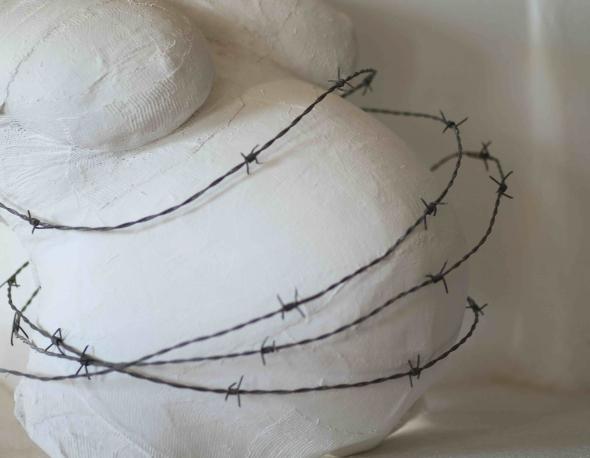 Galeria das Experiências Obstétricas, foto de Catarina Barata, 2019
Galeria das Experiências Obstétricas, foto de Catarina Barata, 2019
The way people give birth and are born depends on social, cultural, economic, historical, and political factors. In Portugal, as in other countries, a growing number of women are questioning whether it’s inevitable to suffer abuse during childbirth. This presentation is based on an ongoing research on perceptions, discourses, and representations about experiences of obstetric violence.
Catarina Barata is an anthropologist and video artist. PhD candidate in Anthropology at the Institute of Social Sciences of the University of Lisbon (ICS-ULisboa) researching about experiences of obstetric violence.
—
The body and the work of women: a plural condition
Inês Brasão
The first time March 8 was celebrated in Portugal, the year was 1975, Jornal de Notícias wrote as a headline: “International Women’s Day: It is urgent to release the subproletariat”. Having this as a starting point, we question the body and the work in the plural feminine condition.
Inês Brasão is a sociologist, teacher, author of O Tempo das Criadas (2012) and coauthor of Fêmea, Uma História Ilustrada das Mulheres (2019).
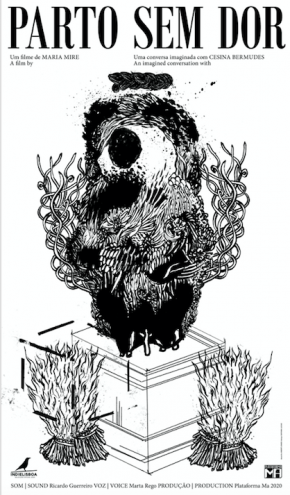 Cartaz do filme 'Parto sem dor', de Maria Mire. Desenho de André Lemos, design de Dayana LucasPainless Labour, Maria Mire Documentary, 2020, 22 min
Cartaz do filme 'Parto sem dor', de Maria Mire. Desenho de André Lemos, design de Dayana LucasPainless Labour, Maria Mire Documentary, 2020, 22 min
In an act of sincere generosity, an 80 year old woman offers furniture to a young neighbour who lived on Santos Dumont Avenue. One morning, possibly spring, while reading a newspaper clipping about a woman doctor who lived on the same avenue, that generous woman finally got a name: Cesina Bermudes. Doctor, obstetrician, researcher, and feminist, Painless Labour is a portrait of someone that so surreptitiously passed through our lives but left a legacy that we try to unwrap.
Maria Mire (Maputo, 1979) has a PhD in Art and Design by the Faculty of Fine Art of Porto (2016), with the thesis Fantasmagorias: A Imagem em Movimento no Campo das Artes Plásticas [Phantasmagoria: The Moving Image in the Field of the Visual Arts]. Currently, she is a teacher co-responsible for the Department of Cinema/Moving Image at Ar.Co, in Lisbon, and a visual artist.
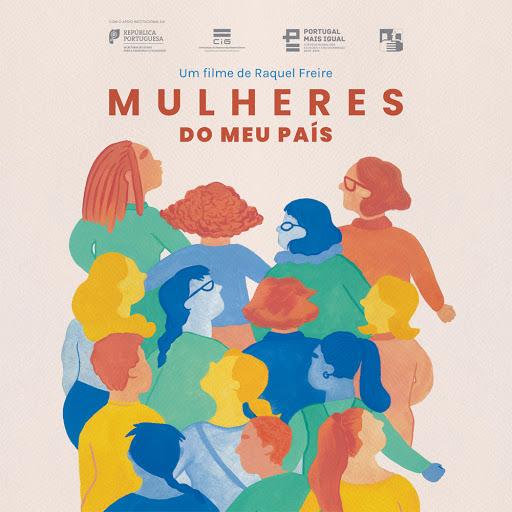 cartaz do filme 'Mulheres do meu país', de Raquel Freire
cartaz do filme 'Mulheres do meu país', de Raquel Freire
Women of My Country, Raquel Freire
Documentary?, 2019, duration?
With Adelaide Costa, Alice Cunha, Ângela Pica, Clara Queiroz, Leonor Freitas, Lúcia Vaz, Márcia Sousa, Maria do Mar Pereira, Maria Inácia Flores, Maria João Pereira, Maria José Neto, Mynda Guevara, Perpétua Flores, e Toya Prudêncio.
This film is a portrait of the condition of Portuguese women in the 21st Century taking into account the several axis of intersectionality, of options, of emancipations, of how it is to live today with all the inequalities and hardships, and how it is to overcome them today in this territory. This documentary shows us 14 Portuguese women that have in common “the strength and the capacity of looking at the world around them, of understanding and transforming it”. From the cleaning lady to the geneticist, from the fisherwoman to the informal caretaker: each one of these women holds a country within herself. This documentary is inspired by Women of My Country (1948) by Maria Lamas, a book that has been on Raquel Freire’s nightstand for many decades, mainly, because of the “profoundly feminist vision, of equality and of freedom” of the writer, journalist and Portuguese activist.
A comment of the film by Susana Peralta and talk with the film director.
Raquel Freire (Porto, 1973) is a filmmaker, writer, screenwriter, producer, citizen and mother. She studied Law, Cinema History and Aesthetics, and Portuguese Cinema History and Aesthetics at the University of Coimbra. She directed Rio Vermelho, Rasganço, Veneno Cura, SOS, Esta é a minha cara: criadores de teatro, L’Academie, and Dreamocracy. She was distinguished at the Cannes Film Festival by the European Film Foundation as a Young European Producer.
Susana Peralta is economist and professor.
20/09/2020 Sunday
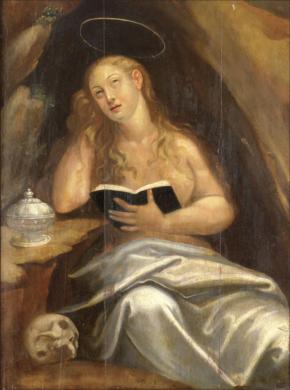 Santa Maria Madalena, óleo sobre madeira, sec. XVII, autor desconhecido. Museu de Angra do HeroísmoHealing: Intimate reports on the body in sickness and in treatment. A rehearsal for a lecture-performance
Santa Maria Madalena, óleo sobre madeira, sec. XVII, autor desconhecido. Museu de Angra do HeroísmoHealing: Intimate reports on the body in sickness and in treatment. A rehearsal for a lecture-performance
Sara Goulart and Susana Sá
Healing is a moment of sharing the radical experience of women’s bodies in sickness and when making decisions about the cure, in opposition to the gaze of institutions and of the other. It proposes a dramatized documental report exploring tensions and alliances, knowledge, power, and terminology.
Sara Goulart studied literature and is a cultural producer.
Susana Sá studied political science and international relations, and is an actress and stage director.
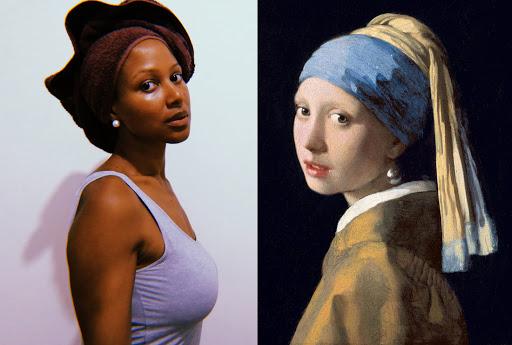 Museu Pessoal, de Gisela Casimiro
Museu Pessoal, de Gisela Casimiro
Personal Museum Gisela Casimiro
Establishing a dialogue between ancient and contemporary art, this work is part of the dream of building the artist’s personal museum, populated by reinterpretations of more or less immediately recognizable artworks, pictures of celebrities and even friends. As an African (Guinea-Bissau, b.1984) living in Portugal since 1988, Casimiro’s experience is somewhat intimately African (at home through language, music, food) and externally European (on the street through language but also through school, work, and the blatant awareness of difference). In the artist’s words, “maybe the mirror will unify these two extremities”.
This installation will be screened and commented by the artist in discussion with anthropologist Patrícia Azevedo da Silva.
Gisela Casimiro (Guinea-Bissau, 1984) is a Portuguese writer and artist, with a degree in Portuguese and English Studies. She is the author of the book of poetry Erosão [Erosion] (Urutau, 2018) and a columnist for Hoje Macau newspaper. She is the Director of Culture at INMUNE - The Black Women Institute in Portugal. Her photographic essay Museu Pessoal [Personal Museum], which questions and aims to redefine black presence in museums, was part of group shows curated by DJASS (2018) and the Portuguese Anthropological Association (2019). She does theatre acting and volunteer work.
Patricia Azevedo da Silva is an anthropologist, mother, writer, and activist, that likes city squares and works about love as a language. Her PhD dissertation is about food as vehicle-language of that love.
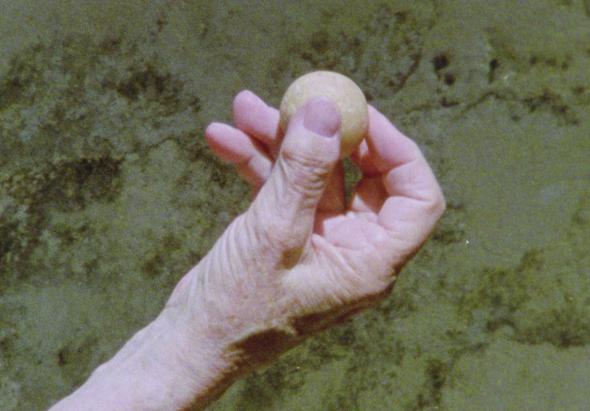 Suzane Daveau, realização Luisa Homem, produção Terratreme
Suzane Daveau, realização Luisa Homem, produção Terratreme
Suzanne Daveau, Luisa Homem Documentary, 2019, Super 8, 119’
In the words of French-Portuguese geographer Suzanne Daveau, “There is no science, nor progression of thought without love, without passion, without identification, even when we focus on things apparently devoid of life, such as the evolution of a slope or the genesis of a downpour. You could, perhaps, routinely apply a technique with pure objectivity, but under no certainty could you discover something new unless the researcher were fully involved in the topic that he was trying to investigate”. The documentary Suzanne Daveau traces the outline of an adventurous woman that crosses the 20th century right up to modern day, guided by her passion for investigative geography. The film circles between the innumerable world-spaces roamed by geography and the reserved home-spaces that welcomed her private life.
Luisa Homem (Lisboa, 1978) is a film director, editor, and founding member of the production company Terratreme Filmes. She directed diverse institutional films, and was hired for various other projects, as well as directing the 13-episode television series Um Dia no Museu [A Day at the Museum] about art museums in Portugal, production of C.R.I.M. for RTP2. She co-directed the documentaries As Cidades e as Trocas [The City and The Trades] with Pedro Pinho and São Tomé e Príncipe: No Trilho dos Naturalistas [São Tomé and Príncipe: In the Path of the Naturalists] with Tiago Hespanha.
———-
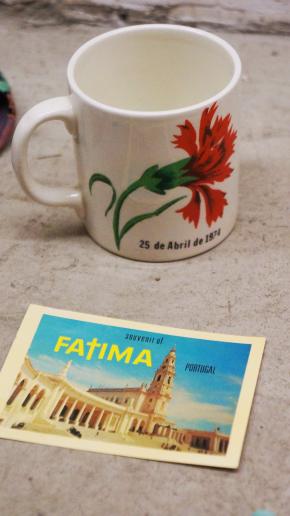 'coisas de lá / aqui já está sumindo eu', foto de Rita BrásStuff from yonder/Here I am already fading away: Objects and Images between Portugal and Brazil Ana Gandum and Daniela Rodrigues
'coisas de lá / aqui já está sumindo eu', foto de Rita BrásStuff from yonder/Here I am already fading away: Objects and Images between Portugal and Brazil Ana Gandum and Daniela Rodrigues
Between 2015 and 2017, these researchers handled, displaced, reproduced, and mixed up photographic souvenirs sent and received by Portuguese migrants between Portugal and Brazil until the 1970s, and objects that traveled in the luggage of Portuguese people that lived in Rio de Janeiro during the first decades of the 21st century. Throughout this process, the authors conceived Stuff from yonder/Here I am already fading away — a visual installation composed by those objects and images —, and produced a catalogue in the form of a composite and malleable book. In this conference, Ana and Daniela will be using this device to tackle unusual associations between things, discourses, and images. What luminous and solitary potential might be triggered by these fragments?
Ana Gandum is a visual artist and historian.
Daniela Rodrigues is an anthropologist and a researcher at CRIA – Center for Research in Anthropology.
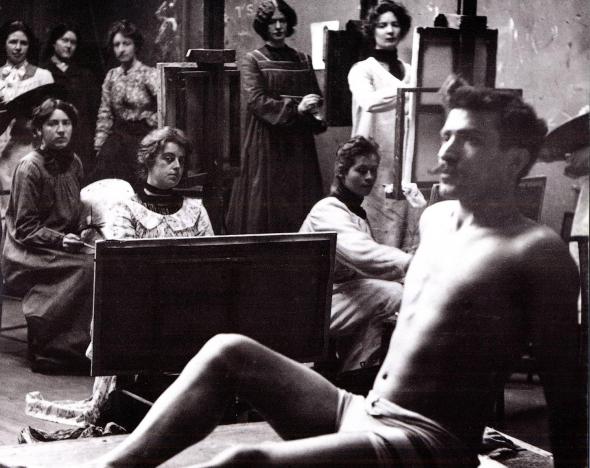 Art students, 1900. Herkomer Art School, Bushey, Hertfordshire, UK.
Art students, 1900. Herkomer Art School, Bushey, Hertfordshire, UK.
Art Without History: Women and Artistic Culture
Filipa Lowndes Vicente
A reflection on how art history has studied feminine artistic practice, mainly in Europe, between the 16th and 20th centuries. Subsequently, it is also an art history, a history of how art produced by women was ignored and undervalued for so long, in order words, an art without history. And how, in the last decades, as a result of feminist approaches, it has become, also, an art with history.
Filipa Lowndes Vicente is an historian and a researcher in the Institute of Social Sciences of the University of Lisbon.
AND Lab — Art-Thinking & Politics of Togetherness Fernanda Eugénio
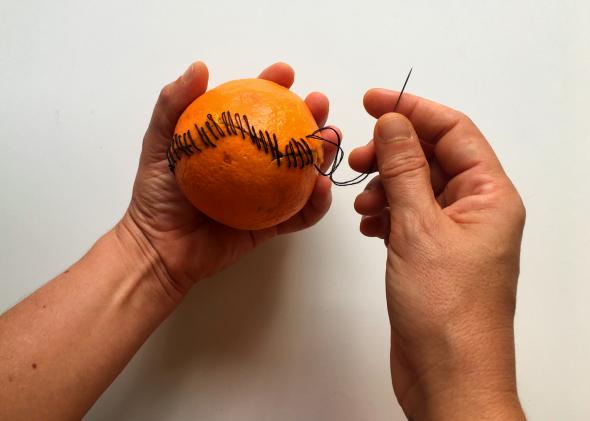 photo by Fernanda Eugénio.
photo by Fernanda Eugénio.
AND Lab is a practice-based research platform dedicated to the continuous unfolding, transmission, and applications of the Modus Operandi AND (MO_AND), a methodology for experiential research of relation and reciprocity, concerned with a political and ethical-aesthetic stance. With a transversal application to several areas, from the daily handling of living-together to collaborative creation, from artistic practices to care practices, from the work of mediation to the work of intervention, from the cartography of individual affections to the struggles for transformation and social justice, MO_AND can be summarized in a triple procedure: Re-parar, Reparagem, and Reparação [All three words in Portuguese play with the meanings: “to repair”, “to stop again”, and “to take notice”]. Part of what makes MO_AND at the same time singular and broad is the commitment to perform the concepts — turning them into tools and returning them to a very direct and in situ use. Its headquarters are in Lisbon with other offices in Curitiba, Rio de Janeiro, São Paulo, and Madrid.
Fernanda Eugénio is an anthropologist, artist, researcher, and teacher. She is the head of the AND Lab Platform | Art-Thought and Politics of Coexistence.
Reading of poems from Mulher ao Mar [Women Overboard] (2010) by the author herself, Margarida Vale de Gato.
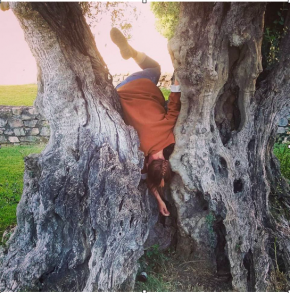 Arse Over Tit, by Andreia CunhaArse Over Tit Andreia Cunha
Arse Over Tit, by Andreia CunhaArse Over Tit Andreia Cunha
The Arse Over Tit series started as a display mechanism of failure and vulnerability on social media. Following some friends’ opinions on the negative “social effects” of expressing ridiculousness on a non-anonymous or non-private Facebook profile (in opposition to images of success more adequate to professional and social responsibilities, as they would say), it all began by showing the literal disastrous fall. But, sometimes, falling can be a simple ethical investment.
Andreia Cunha studied Political Science in Lisbon. She was the executive director of Maria Matos Municipal Theatre from 2008 until 2018 and took on, since 2019, the same role at Teatro do Bairro Alto (TBA), dedicated to emerging and experimental performative arts.
—
Ways of Doing: A Gendered Anticolonial Agency
A screening with interruptions Rui Vilela
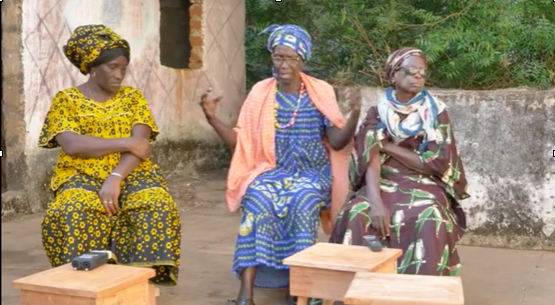 Brinsam Nassentche, Nhima Turé and Segunda Lopes. photo by Rui Vilela, 2020.
Brinsam Nassentche, Nhima Turé and Segunda Lopes. photo by Rui Vilela, 2020.
“Since 2016 I have been talking to Bissau-Guinean women to learn about their perspective on the ways of doing the Liberation Movement. In earlier years, I met Francisca Pereira, Teodora Inácia Gomes and Tchadi Sambu. More recently, I had the chance to meet Brinsam Nassentche, Nhima Turé and Segunda Lopes. These dialogues turned into a possibility to articulate a gendered anticolonial agency as carried out in their daily lives amidst the Liberation Movement against Portuguese colonial rule. The author Stephanie Urdang had already in 1979 published Fighting Two Colonialisms: Women in Guinea-Bissau. Yet, recent research by scholar Patrícia Godinho Gomes justifiably points out a still existing historiographical gap concerning the life paths of women in the context of the struggle. The aforementioned women were actively engaged in constructing an independent state: they were fighters, teachers, nurses, political commissioners, and international representatives.” Rui Vilela
Rui Vilela is an independent artist based in Berlin. His work was most recently presented at the Neuer Berliner Kunstverein [New Berlin Art Society]. He is currently a PhD student in Music with specialization in Ethnomusicology at the University of Aveiro.
Farce. Language, Collapse and Fiction: Rehearsing the Curatorial Marta Mestre
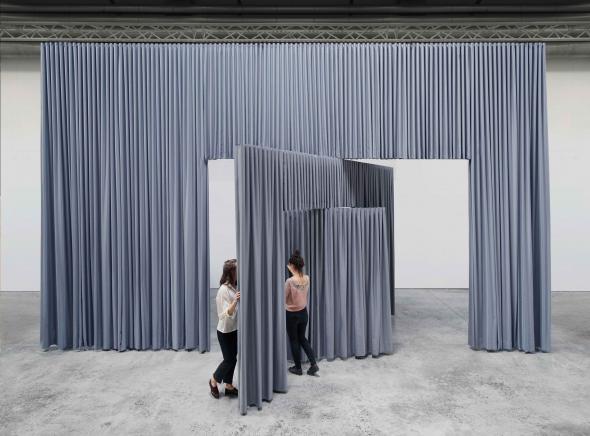 Renata Lucas, farsa, 2019, fabric, metal, photo by neugerriemschneider
Renata Lucas, farsa, 2019, fabric, metal, photo by neugerriemschneider
An exhibition about language, failing, and fiction, Farsa[Farce] (SESC – Pompeia, São Paulo, 2020) crosses the material dimension of discourses, a rift in reason, and the vital fabulation of life. By connecting experimental proposals from the 1960s and 1970s and artists who emerged in the 21st century, the exhibition lays emphasis on the power of language but also on its own strategies for deconstruction as potential machinery. The exhibition brings together artists, writers, and other creators, and close to 140 historical and contemporary works of art. It presents graphical works, collages, visual poetry, publications, objects, and installations that examine the interrelations between language and art, poetry, politics, and gender issues. This talk by Marta Mestre, curator of the exhibition, will shed light on the idea of farce and parody as means to question the coloniality of language, and the idea of open-ended history. How to weave back together again that which is divided and fragmented?
Marta Mestre is an independent curator and works in Lisbon and São Paulo. She graduated in Art History and in Culture and Communication, and was the curator of shows in several institutions such as Inhotim Institute (Minas Gerais, Brazil), Modern Art Museum in Rio de Janeiro (Brazil), and at the School of Visual Arts of Parque Lage, Rio de Janeiro (Brazil). She’s a new artistic director of Centro Internacional das Artes José de Guimarães (CIAJG).